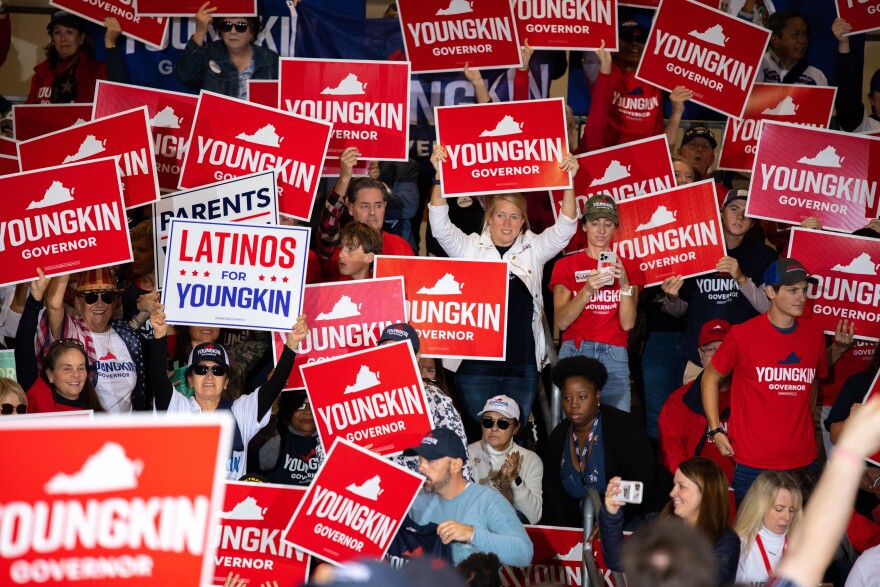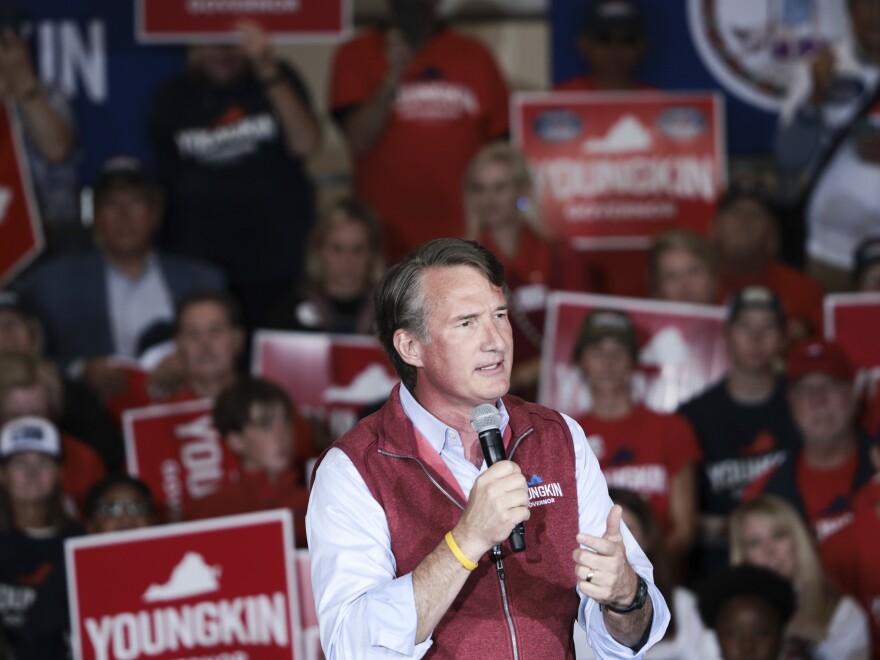Updated November 3, 2021 at 12:46 AM ET
Republican Glenn Youngkin has defeated Democrat Terry McAuliffe in the race for governor in Virginia, according to a call from The Associated Press.
Loading...
McAuliffe formally conceded Wednesday morning. He congratulated Youngkin and said he is "confident" in the long-term path of Virginia, according to a report from The Hill.
However, the former governor reiterated his campaign's progressive agenda.
"We must protect affordable health care coverage, raise the minimum wage faster, and expand paid leave so working families have a fighting shot," he added in the reported statement. "We must protect voting rights, protect a woman's right to choose, and, above all else, we must protect our democracy."
Youngkin's victory ends a long losing streak for Virginia Republicans who haven't notched a statewide election win since 2009. However, it follows the relatively recent trend of Virginians in odd-year elections voting against the party in the White House.
The win for the GOP could also be a sign of what is to come in the 2022 midterm elections when the balance of power in Congress is up for grabs – and 36 states hold gubernatorial elections.
Youngkin's victory could be a template for other Republicans. The former private equity CEO and first-time candidate drew raucous crowds in the closing stages of the race by channeling conservative outrage over public education. Many supporters said they were enthusiastic about his defense of parents who are concerned about the way race is taught in school, as well as new protections for transgender students passed by the Virginia legislature.
Based on early returns, turnout for the race appears to have been higher than the most recent Virginia race for governor in 2017.
In the last weeks of the campaign, the race was neck and neck between the two candidates who crisscrossed the state pleading with voters to cast a ballot in this off-year election that generally yields much lower turnout than presidential election years. Princess Blanding, an outspoken advocate of criminal justice reform, was a third-party candidate on the ballot.
Youngkin will face immediate challenges in making good on his campaign promises. Democrats still hold a 21-19 majority in the state Senate, meaning Youngkin will have to peel away votes to get his agenda passed. He has an ambitious plan for his first day in office: banning the teaching of "critical race theory" (not a part of Virginia's K-12 state curriculum), firing Virginia's parole board, eliminating a slew of taxes and increasing teacher pay. Most of the proposals, though, will require approval from the legislature.
Youngkin's win restores some power that Republicans lost in a state that has turned increasingly blue. During President Donald Trump's time in office, Republicans lost control of the state legislature and three congressional seats. Democrats still hold both of the U.S. Senate seats and the majority of the state's congressional delegation.
Youngkin drew large crowds across Virginia who cheered loudest for his calls to ban "critical race theory" while he evoked a dire picture of classrooms where students are classified by race, seeming to reference equity programs launched by some school districts to address long-standing systemic racism in education.
"To teach our children to divide everyone through a lens of race, and call one group 'oppressors' and one group 'victims' and pit them against one another is not right," Youngkin said to cheers at a rally on Monday. "We know it's not right."

Youngkin made reopening schools an early part of his platform when he emerged from relative obscurity to announce his candidacy in January of this year. At the time, the former CEO of Carlyle Group wasn't widely known beyond a small handful of party insiders. He had spent 25 years working his way up through the large private equity firm.
Youngkin's lack of record and ample personal wealth proved helpful on the campaign trail. He spent $20 million of his own money on his campaign. His main issue during a contentious GOP nominating fight was "election integrity," and early on, Youngkin refused to say whether Biden's election was legitimate. Later, he clarified he believed the 2020 election was fair but continued to campaign alongside election deniers like state Sen. Amanda Chase.
McAuliffe tried to paint Youngkin as an extremist who is using "racist dog whistles" to rally voters in a mode he says evokes former President Donald Trump, who repeatedly endorsed Youngkin.
But the connection between the affable, fleece-vest-wearing Youngkin and Trump didn't appear to persuade enough voters. That may have been, in part, because the candidate publicly tried to keep his distance from the former president. Youngkin didn't attend a Monday night "tele-rally" Trump held for him and skipped a so-called "Take Back Virginia" rally last month in suburban Richmond at which the crowd pledged allegiance to a flag that organizers said was carried at the riot at the U.S. Capitol on Jan. 6.
Youngkin later called the Pledge of Allegiance, "weird and wrong."
When Trump called into the rally, he slammed McAuliffe, repeated false allegations of election fraud and praised Youngkin.
Rich Meagher, an associate professor of political science at Randolph-Macon College, said national Republicans would likely use Youngkin's campaign as a template in next year's elections given the enthusiasm it generated. Democrats, he said, needed to reevaluate their strategy of painting all Republicans with a "Trump brush" and talk more about their policies and achievements.
"It was kind of like they had Plan A and they never went to Plan B," Meagher said. "It might be good to remind people of sort of the underbelly of Republican politics, but at some point, you've got to talk about what you do and what your message is and what you offer."
Ben Paviour is VPM's state political reporter and Jahd Khalil is a reporter with WVTF in Richmond.
Copyright 2021 NPR. To see more, visit https://www.npr.org.


